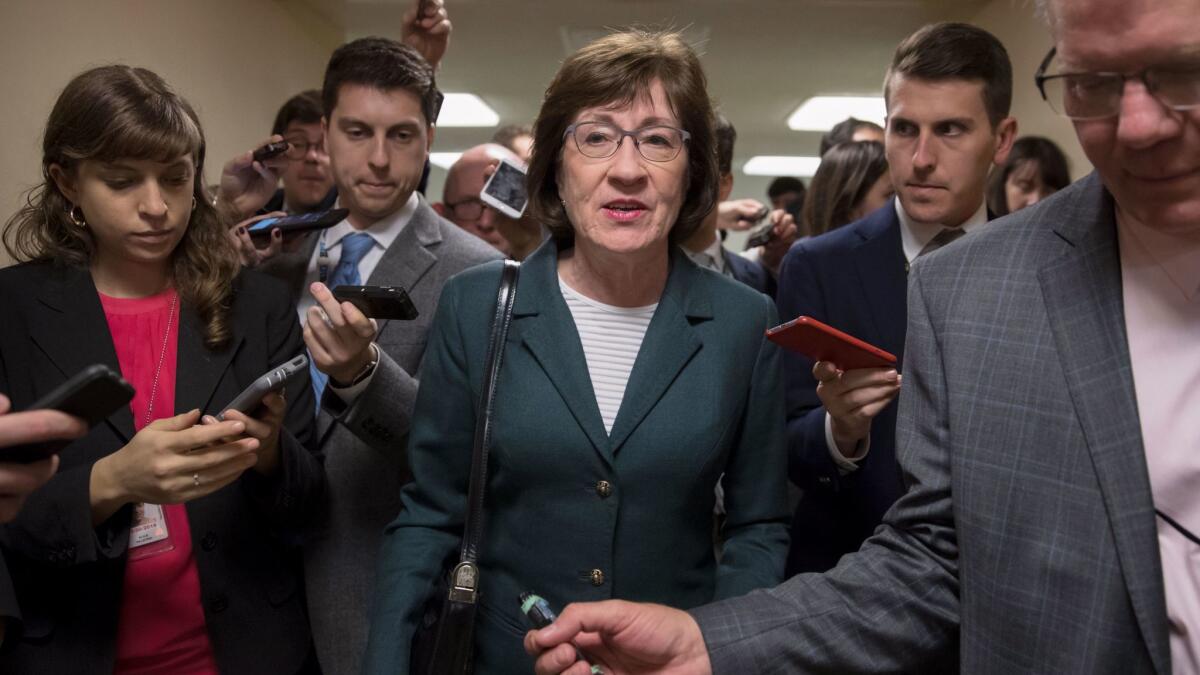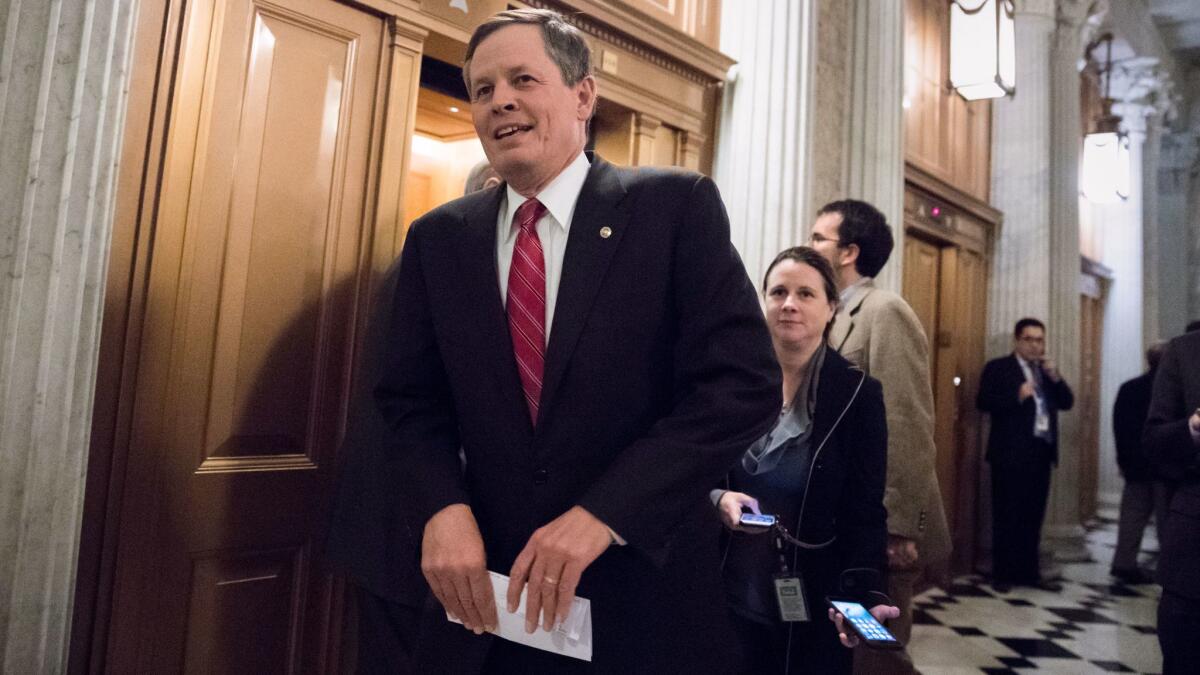Democrats’ hopes for capturing a Senate majority fade

Democrats’ hopes of sweeping to a Senate majority faded as marquee contests stretched into overtime early Wednesday and some of the most vulnerable Republican incumbents remained in contention while the vote counts dragged on.
Sens. Thom Tillis of North Carolina and Susan Collins of Maine, whose defeats had been considered essential building blocks of a new Democratic majority, held narrow leads over their opponents in nearly complete results. If they eke out wins, Democrats’ path to a majority would all but vanish.
Given the races remaining to be called, perhaps the best Democrats could achieve is a 50-50 split, which would give them a majority only if Joe Biden won the presidential election and his running mate, California Sen. Kamala Harris, then became vice president and presided over the Senate as its tie-breaker.
Democrats had headed into election day favored to win a slight majority in the Senate, but returns were mixed early on as polls closed across the country.
Sen. Cory Gardner of Colorado was beaten by Democratic former Gov. John Hickenlooper, whose candidacy was boosted by President Trump’s unpopularity in the state. But Gardner had been Democrats’ easiest target, and their gain of that seat was offset by their loss of a seat in Alabama held by Sen. Doug Jones, whose defeat by Republican Tommy Tuberville, a former head football coach at Auburn University, had been widely expected. In 2017, Jones won a fluke victory in the deep-red, pro-Trump state against a Republican rival hit by a sex scandal.
Other Republicans facing surprisingly stiff challenges — Sens. Joni Ernst of Iowa, Steve Daines of Montana and Lindsey Graham of South Carolina — all pulled out victories.
The fate of the presidency still hangs in the balance as President Trump and Joe Biden duel over a few remaining battleground states.
Sen. Mitch McConnell of Kentucky easily beat Democrat Amy McGrath, a veteran whose campaign drew national attention and money from Democrats who wanted to end his reign as Senate majority leader. And McConnell’s lieutenant, Senate Majority Whip John Cornyn of Texas, beat Democrat MJ Hegar, again dashing Democrats’ hopes that the Lone Star State had turned blue.
Republicans now hold a 53-47 edge in the Senate. Democrats needed a net gain of four seats to achieve a majority — or three if Biden won.
The Senate contest this year has been fought on a political map that favored Democrats: There were 12 competitive races in states with Republican-held seats while only two Senate Democrats were considered vulnerable, according to the nonpartisan Cook Political Report.
In Arizona, Democrat Mark Kelly, a former astronaut who has been one of Democrats’ strongest fundraisers, beat Republican Sen. Martha McSally.
Democrats were looking to regain the Senate majority for the first time since 2014. They had swamped their GOP rivals in fundraising. The nonpartisan Center for Responsive Politics found that Democratic Senate candidates raised $726 million through the end of September to Republicans’ $423 million.
That made for a tough slog for Republican senators who were seen as vulnerable from the outset, like Tillis, as well as others who started strong but were dragged down by President Trump’s sagging fortunes, like Ernst.
“I’ve got a little bit of a scratchy voice today but it’s all good, election day is here,” Ernst said in a Tuesday radio interview with conservative pundit Hugh Hewitt. Tillis, also speaking to Hewitt, described the home stretch: “I’ve eaten about 30 pounds of barbecue over the last seven days and talked to a lot of people.”
The fate of candidates of both parties was closely tied to the outcome of the presidential race because ticket-splitting voters are increasingly rare. In 2016, for the first time ever, there was no state that voted for a Senate candidate of one party and the presidential nominee of the other party.
The makeup of the Senate will not be settled for some time because of the large number of mail-in ballots to be counted — an unprecedented share reflecting many voters’ desire to avoid polling places amid a pandemic. And in at least one state — Georgia, which had two Senate seats up for grabs — final results will be delayed because election laws require candidates to win by a majority vote.
Georgia Republican Sen. Kelly Loeffler heads to a Jan. 5 runoff with Democrat Raphael Warnock, a pastor at Atlanta’s Ebenezer Baptist Church, where civil rights leader Martin Luther King Jr. preached. No one hit 50% in the all-party, multicandidate election to oust Loeffler, who’d been appointed to the seat in January to replace Sen. Johnny Isakson after he retired because of ill health.
In Georgia’s other Senate race, incomplete returns had Republican Sen. David Perdue leading Democratic rival Jon Ossoff, but their race also would go to a runoff if Perdue’s vote share drops below 50%.

Results could also be delayed in Maine. If neither Collins nor Democrat challenger Sara Gideon win a majority, the race will be settled through the state’s relatively new system of rank-choice voting, which could take a week or more to complete. Voters cast ballots in which they also list their second choice, and those preferences are tabulated if no one reaches 50% in the first round. That is potentially problematic for Collins because a dark-horse candidate, a progressive running as an independent, had urged her supporters to list Gideon second.
Collins is at risk in a Democrat-leaning state against Gideon, the speaker of the state house. Democrats have been portraying Collins as a Trump enabler, particularly because of her support for Supreme Court Justice Brett M. Kavanaugh, challenging her reputation as an independent voice who has delivered for her constituents.

In North Carolina, Tillis’ fate hinged heavily on how Trump did in a state he won in 2016. In incomplete returns, he was running slightly ahead of Democrat Cal Cunningham, a businessman and veteran who was recently set back by news that he’d had an inappropriate extramarital relationship.
Republicans had one other Democratic target in sight: first-term Sen. Gary Peters of Michigan, challenged by Republican John James, who would become the second Black Republican in the Senate if he won.
Times staff writer Jennifer Haberkorn contributed to this report.
More to Read
Get the L.A. Times Politics newsletter
Deeply reported insights into legislation, politics and policy from Sacramento, Washington and beyond. In your inbox three times per week.
You may occasionally receive promotional content from the Los Angeles Times.









